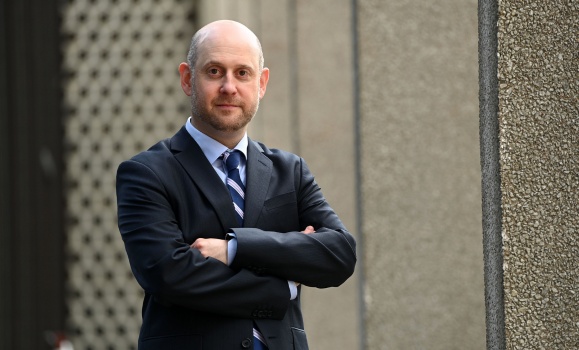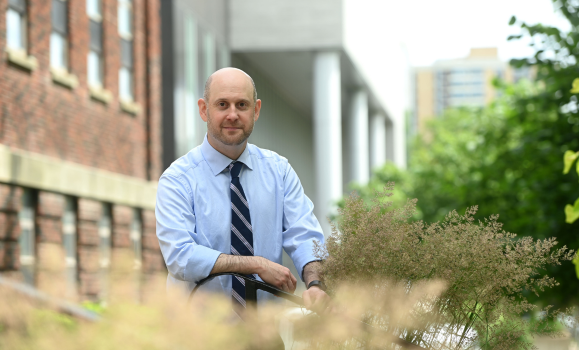Forward together
» Go to news mainNew associate dean, UGME, Dr. Ian Epstein’s vision for medical education

When Dr. Ian Epstein reflects on his professional journey, beginning as a medical student at Dalhousie and now stepping into the role of associate dean of undergraduate medical education (UGME), he speaks often about togetherness.
It’s not just a passing thought. It’s a philosophy.
“We live in a time where external forces like social media, algorithms, and politics often try to divide us,” he says. “Our work must resist that. It should bring people together.”
Dr. Epstein, who completed both his undergraduate and postgraduate training at Dalhousie Medical School, began his tenure as associate dean on July 1, 2025. It's a role he says means a lot both personally and professionally.
“Becoming a doctor shapes your entire life; it’s more than just a profession. So, returning to serve in this capacity, in a program that shaped me, feels like an extraordinary opportunity.”
Dr. Epstein sees this new chapter not as a departure, but as a natural extension of his work as assistant dean of the Office of Professional Affairs (OPA), a position he has held since the office was established in 2022. He worked closely alongside the assistant dean, OPA for DMNB, Dr. Samatha Gray, and leadership to build the OPA from the ground up. The office works closely with both undergraduate and postgraduate medical education (PGME) on sensitive student issues. This meant Dr. Epstein had engagement with students, unit heads, clinical instructors and many others deeply entrenched in the UGME world, significantly impacting his approach to his new role. His biggest takeaway: ensuring students have the best possible learning environment must be central to the work of the Faculty.
“It’s not about perfection. It’s about being kind, supporting each other, and making hard work less difficult by treating one another with respect,” he says. “Let’s give it a bit of a family vibe. Things aren’t perfect in families, but there’s support and kindness and that’s the kind of culture I want to nurture.”
This attitude extends to how he hopes the UGME office functions internally and in partnership with others.
“I want students to feel like UGME, student affairs, OPA, CPDME, and PGME are all part of the same team. In fact, I wouldn’t mind if students didn’t even know which office does what, just that they have support no matter where they turn.”
Transformative medical education
Dr. Epstein approaches his new role with both excitement and trepidation.
“It’s a big role,” he says. “It involves overseeing hundreds of students across three campuses and distributed clinical sites in three provinces. That’s a lot of responsibility, but it also means having a wide-reaching impact.”
During his tenure as internal medicine PGME program director, Dr. Epstein oversaw approximately 200 residents for over a decade. Watching them grow, graduate, and go on to care for patients was profoundly fulfilling. In his new role, he sees an opportunity to amplify that influence, supporting even more learners as they begin their journeys in medicine.
And as he begins his own journey as associate dean, he has outlined four broad priorities that align with his collaborative approach—priorities he says are well-established thanks to the excellent work of outgoing associate dean, UGME, Dr. Evelyn Sutton, her predecessors, and the other assistant deans in the Faculty of Medicine.
With the recent UGME accreditation process behind the Faculty, Dr. Epstein’s first focus is to closely review the results when they are received in the fall and lead a coordinated response to areas for continued growth.
His second priority is accessibility and equity-related initiatives, for which he remarks on the progress made, but the extensive work that still needs to be done.
“The learning environment reflects centuries of societal baggage and while we’ve made steps toward reconciliation and inclusivity, with admissions pathways, PLANS (Promoting Leadership in health for African Nova Scotians), and KW (Keknu’tmasiek Ta’n Tel Welo’ltimk), those are just beginnings. We need to go further. We must talk about this openly and often, even when it's uncomfortable. It can't be a one-and-done initiative. We must maintain momentum.”
He’s particularly committed to working more closely with Dalhousie’s community-facing units, including PLANS, KW and associate dean of serving and engaging society, Dr. Gaynor Watson-Creed's office, and ensuring diverse voices guide ongoing reforms.
Dr. Epstein’s third priority, and one that, as mentioned, encompasses his whole philosophy and also overlaps the first two priorities, is improving the learning environment.
“How was the learning environment evaluated by students during accreditation, and how does our entire community feel about it,” he asks. “The goal is to continuously improve the learning environment and create the best educational environment in Canada, and potentially the world.”
Dr. Epstein’s final priority—assessment innovation—will be an ongoing focus, recognizing that educational practices and assessment strategies are continually evolving. With entrustable professional activities (EPAs) and competency-based education recently introduced in clerkship, his goal is to continue modernizing and advancing the assessment system to better support student learning. While he is proud of Dalhousie Medical School’s strong performance, including high Medical Council of Canada Qualifying Examination results and well-prepared graduates, he is committed to ongoing improvement and staying at the forefront of assessment science, particularly as tools like AI become more integrated into medical education.
He also acknowledges some of the big challenges ahead such as expanding clinical capacity across multiple provinces, faculty development, and maintaining excellence across a growing, distributed program, will require focus, alignment, and a shared sense of purpose.
“We must keep moving forward, listening to our communities, staying open to feedback and being ready to change are all vital,” he says. “This includes acknowledging mistakes, embracing new ideas, and staying humble. We don’t have all the answers.”
A culture of support and excellence
As he begins this new chapter, Dr. Epstein brings a rare combination of vision, humility, and deeply held values. His energy is infectious. His intentions are clear.
“I want us to be known as the friendliest, most supportive medical school in Canada. A place where the learning environment is a point of pride, and where we take care of our students, our patients, and each other.”
Recent News
- The Cape Breton Medical Campus opens its doors
- Dalhousie team advances epilepsy outreach in Zambia
- Eskasoni Doctor to Serve as Academic Director at Cape Breton Medical Campus
- Canadian Medical Hall of Fame Award for Students: Jeremiah Philips
- Dal’s 2025 research awards
- Six accomplished individuals honoured as notable Dal alumni
- New hope for for Fabry patients
- New associate dean, UGME, Dr. Ian Epstein’s vision for medical education

